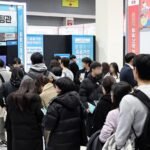Recently, there’s been considerable discourse around generational rifts, especially pronounced among men. Here is a recent article from Joonang Ilbo on the topic. I initially used machine translation and then edited some parts I found awkward for clarity.
They just want to live youthfully… So why the backlash against the ‘Young Forty’ crowd?
8:30 a.m. on the 3rd, at a café in Mapo-gu, Seoul. Dressed in a black sweatshirt, gray jogger pants, and New Balance sneakers, 42-year-old office worker Kim Hyun-soo opened his laptop. Next to his coffee cup sat a Stanley tumbler, currently a hot item. “Today’s my weekly work-from-home day, and I just wanted to dress neatly,” he said. “But apparently, dressing like this these days makes you look like an ‘older guy trying to act young.’”
After finishing work and heading home, Kim said he planned to pour himself a glass of wine delivered through a subscription service. “When people in their 20s do it, it’s called emotional consumption. But when someone in their 40s does it, they say it’s emotional indulgence,” he said. “I’m just trying to keep up with trends because I don’t want to be seen as a boomer…” Kim couldn’t hide a bitter smile.
The term Young Forty (영포티), originally coined in the retail industry, referred to people in their 40s who enthusiastically embraced youthful sensibilities and culture. But online, it has gradually taken on a mocking tone. A major turning point came in the early 2020s with the viral spread of the phrase Sweet Young Forty on social media. On the surface, it seemed to describe a stylish man in his 40s, but in reality, it was a satirical jab at middle-aged men who act sweet only toward women in their 20s, while being strict with young male employees and overly friendly with young female ones. The term called out this behavior as a form of inappropriate flirtation disguised as kindness.
Lee Ji-eun (28), an office worker from Songpa-gu, Seoul, remarked, “The real issue with some bosses in their 40s isn’t that they’re trying to act young. It’s that they pretend to be rational. In meetings, they’re strict with male employees in their 20s, but approach female employees with a friendly smile and buy them coffee.” She added, “They present themselves as open-minded, but once you start talking, you realize they’re just typical members of the older generation. Even when it comes to marriage or parenting, they only pretend to empathize.”
Park Min-soo (31), another office worker, shared a similar view. “They act like they’re open to political issues, but in reality, they already have fixed answers,” he said. “Even when you bring up how young people have lost their footing in areas like real estate, they just nod and immediately shift back to their own point of view. That’s the mindset of today’s forty-somethings.”
Professor Koo Jung-woo of Sungkyunkwan University’s Department of Sociology emphasized the need to interpret the Young Forty controversy on two levels. “There’s a layer that can be understood apart from politics, and another that becomes more complicated when politics enters the picture,” he explained.
On the non-political level, Professor Koo interpreted the backlash as a reflection of frustration and satire directed at middle-aged men in the workplace who pretend to understand younger generations but fail to genuinely empathize in conversation, making their behavior seem hypocritical. On the political level, he pointed to how online polarization ties generational, gender, and regional conflicts to ideological divides. “This tendency to reduce cultural and organizational issues to political frames makes it even harder to resolve them,” he noted.
Back to lunchtime on the 4th. Returning to the office after a long time, Mr. Kim headed to a trendy salad café with younger colleagues. As he sipped his coffee, he cautiously dropped a phrase popular among younger people “Gotta live 갓생 these days” but the awkward smiles and sidelong glances from his juniors made it clear the reaction wasn’t great. “If I use phrases young people like, they mock me for being cringey. But if I speak the way my generation does, they call me a boomer,” Kim said, shaking his head. “It feels like I’m taking a multiple-choice test where every answer is wrong.”
On this issue, Professor Kwak Geum-joo of Seoul National University’s Department of Psychology identified a lack of metacognition (self-awareness) as the core problem. “As people age or rise in rank, their thinking tends to become more rigid, yet many still believe they’re free of bias. This creates a cognitive illusion,” she explained. “The greater the gap between one’s ideal self, stylish and open-minded, and one’s real self, the more anxiety and depression can arise. That’s the space where public satire finds its way in.” She advised, “In every situation, it’s important to view yourself from a third-person perspective. Rather than blindly trying to emulate people in their 20s, it’s better to seek role models in their 50s or 60s and cultivate a mature sensibility grounded in listening and consideration.”
Political forums are also rife with criticism, with posts calling Young Forty “the last gasp of progressive boomers” or accusing them of “talking reform while being conservative on gender and climate issues.” Na Jung-yeon, a woman in her 20s, commented, “I don’t think all people in their 40s are like that, but it’s easy to find ones who shout progressive slogans while being more conservative than anyone else in practice. Honestly, if they just admitted, ‘Yeah, I’m a boomer,’ it’d be less frustrating.”
In the consumer market, people in their 40s remain the most powerful demographic. They still lead spending in fashion and food & beverage. Yet criticism often follows, branding them as “pretentious and clueless about value for money.” Cultural critic Jung Deok-hyun responded, “Most people in their 40s aren’t trying to act young. They’re simply trying to adapt to the times. We’ve moved from a generation-based society to one organized around taste. So if we box Young Forty into a generational frame, we risk distorting the reality.”
Professor Lim Myung-ho of Dankook University’s Department of Psychology diagnosed the root of the tension as a deep sense of deprivation felt by younger generations, stemming from rising housing prices and pension reform. “There’s also a growing perception among young people that the 40s and 50s who already hold economic and political power are now trying to claim cultural space as well. That sense of encroachment is fueling resentment,” he explained.
As a result, people in their 20s push back, saying, “The 40s are already part of the establishment, and now they’re invading youth culture too.” Meanwhile, those in their 40s reject the younger generation’s demand to “act their age,” and the Young Forty controversy continues to grow and reproduce itself over time.
Professor Lim added, “The 40s and 50s generation carries both pride in their role in democratization and traces of having grown up in authoritarian environments. This often leads to a mismatch between their outward image and inner mindset.” He advised, “Those in their 20s and 30s should acknowledge the foundations laid by older generations and refrain from excessive ridicule, while the 40s and 50s should tone down the self-display and respond to the younger generation’s struggles like housing and employment with empathy and care.”
It’s also worth noting that many Young Forty individuals see themselves as a “bridge generation.” Kim Jin-woo, a man in his 40s, said, “I understand the language of older generations and have a decent grasp of MZ culture. At work, I try to play the role of a middleman in communication.” But when someone in their 40s dominates a meeting with lengthy remarks while insisting they’re “open-minded,” it often shuts down genuine dialogue. Professor Koo also emphasized, “What younger generations want in a mature adult isn’t flashy language. It’s consistent consideration and tangible support.”
As the Young Forty debate shows, people in their 40s today are caught in a “double bind” across politics, economics, society, and culture. If they try to relate to younger sensibilities, they’re labeled young boomer (영꼰); if they don’t, they’re simply called boomer. If they lean progressive, they’re accused of hypocrisy; if conservative, they’re dismissed as outdated. In this climate, ordinary people like Kim Hyun-soo spend each day in constant self-censorship. “Is it really so wrong to try to live in step with the times?” he asked. “In a society where survival is already a fierce competition, do people in their 20s and 40s really need to be at odds like this? I wish we could move past the mockery. It’d be nice if we could all be just a little more generous with each other.”
Experts agree that generational conflict is nothing new, but they warn that the current tensions have reached a level that can no longer be ignored. They stress the urgency of finding solutions at a societal level. Above all, they caution against the mistake of generalizing entire generations.
Cultural critic Jung noted, “Generational categories have long been shaped more by political and marketing convenience than by lived reality. Today, people are grouped more by personal identity through taste and values than by age. So instead of focusing on generational education, we need to expand opportunities for exchange based on shared interests.” He added that consuming and sharing content and experiences together is far more effective than perfunctory conversations like “How’s it going these days?”
Professor Kwak emphasized the importance of inclusive leadership from those in their 40s, who have the experience of having once been young. “Rather than trying to ‘win’ against people in their 20s, it’s more important for those in their 40s to lead with humility and openness,” she said. “It helps to regularly ask yourself: ‘Did I interrupt someone?’ ‘Am I dominating the conversation?’ That kind of self-checking can go a long way in easing the Young Forty tensions.”
submitted by /u/pomirobotics
[link] [comments]















